Matt Belinkie: The Force Awakens centered around the search for Luke Skywalker; the very first sentence of the crawl was “Luke Skywalker has vanished.” The rebels are desperate to find him and the bad guys are just as determined to get to him first. Now we get a movie about what happens when he’s found. Is the return of Luke Skywalker as much of a game-changer as all the characters seem to expect?
At first glance it seems like no. Luke doesn’t kill Snoke or Kylo Ren. He doesn’t train Rey or anyone else. He doesn’t hand over an ancient Jedi weapon or the secret of ultimate power. All he does is create a delay so the last handful of rebels can escape (their 18th escape of the movie).
Is the point of The Last Jedi just to implode the idea that Luke is a deus ex machina who is going to single-handedly win the war? There’s a moment where Luke is fighting Kylo and he says that he’s not going to be the last Jedi, and that’s cut together with Rey moving all the rocks in front of everyone else in the rebel alliance (which is the first time anybody besides Kylo sees her show off her Jedi moves in public). So the title is a switcheroo, dovetailing nicely with the expectations of the characters. Everyone is expecting Luke Skywalker to determine the fate of the galaxy, but Luke is (quite literally) a mirage. The real Last Jedi sneaks out the back door.
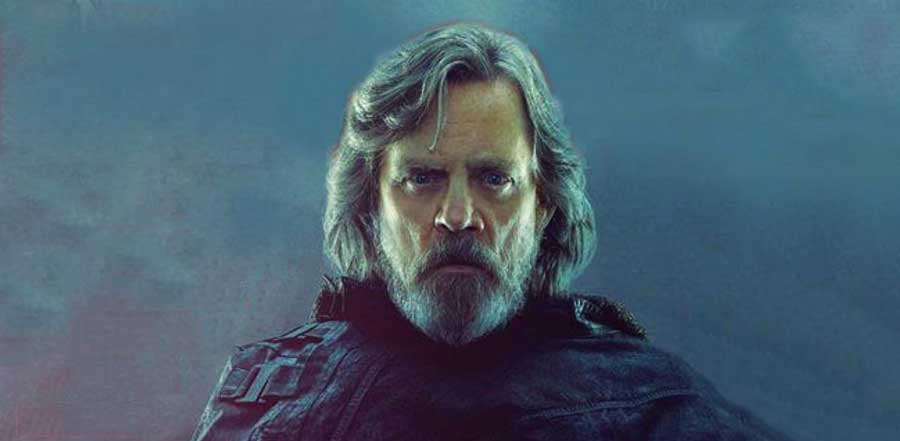
Jordan Stokes: Luke makes fun of Rey for wanting him to be a deus ex machina. Right? The line is something very close to, “What, did you think I was going to march out of this cave and singlehandedly face down the whole First Order with my laser sword?” And then of course there’s a moment near the end where he very nearly does that. But that doesn’t play out the way we thought it would.
But Matt, if you thought the point of Luke’s big moment was just to let the rebels get away, you are confused! I mean, understandably so. Poe says “Luke’s just doing this so we can get away!” like, five times. But helping the rebels escape was just a side effect. Luke’s last stand was really about winning the battle of hearts and minds.
On the heart front: it’s all about that scene at the end with the force-capable stableboy. By facing down the First Order singlehandedly, Luke has planted a hundred-thousand seeds of rebellion among a thousand star systems. (And in that the kid is presented to us as basically a Star Wars fan, it’s a nice throwback to Rey’s doll from The Force Awakens… and of course to our own status as fans of the franchise.)
On the minds front — that line about “if you strike me down in anger I’ll be with you forever, like your father” is really important, I think. Canon-altering.
So there’s this idea floating around — never quite confirmed, but hard to escape if you think hard about the source text — that Jedi are psychically vulnerable. If you ever use the force to do evil, then that makes you vulnerable to getting turned to the Dark Side. We’re meant to believe that this is what happened to Darth Vader, for instance, and that this is what would have happened to Luke if he had killed Vader at the Emperor’s behest.
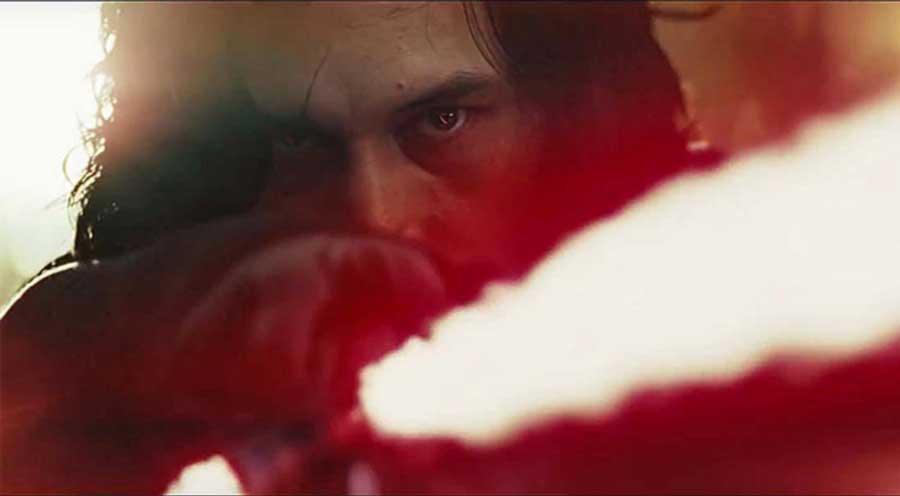
But Luke is now suggesting a mirror image of this. If a Sith has the slightest bit of humanity left, then killing a Jedi in anger — killing anybody in anger, really — might make them vulnerable too. To me, the clear implication of the “like your father” line is that the reason that Kylo didn’t kill Leia when he had the chance was that Han somehow stayed his hand. Maybe not as a blue glowy force ghost, but as a presence that’s something more than a memory. And this suggests that Luke, having died “with purpose,” as Leia put it, is now going to be a much more powerful angel on Kylo’s shoulder. Maybe even in blue glowy form. (That would be interesting, wouldn’t it? If in the next movie Kylo ends up basically haunted by Great Skywalker’s Ghost?)
The point of him fighting Kylo, then, is not to sacrifice himself to save his friends. The sacrifice is the point.
Or at least that’s what I got out of it.
To bring this more back in line with Matt’s question: It’s not that this movie says Luke is not important. But his importance is as a symbol, not as a weapon of war.
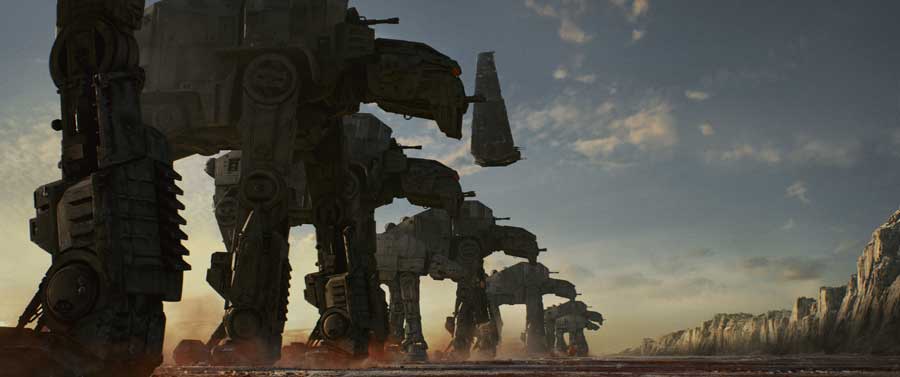
Belinkie: Stokes, I’m not convinced on either of those points. First, if Luke’s showdown with Kylo was supposed to be an act of public performance, who were supposed to be the witnesses? Not the rebels; they are all climbing out of the cave. The First Order? They seem to run a pretty tight ship; it’s not like those stormtroopers get to go home on shore leave and tell war stories. So who exactly lets the galaxy know what happens? Where do the legends come from? Maybe it seems like I’m being nitpicky but I don’t think so. The director could have showed stormtroopers taking off their helmets in shock, First Order discipline overcome with awe at the Jedi. Or he could have made that final confrontation happen in an urban center with thousands of onlookers as opposed to the middle of nowhere. Are we SURE the stableboy is telling the story of how Luke faces down Kylo and not some other Luke Skywalker story? If he’s really telling THAT story I’ll grant you Luke is putting on a show to give people hope, but I definitely feel it could have been executed better.
Secondly, it seems like whatever psychic toll the act of trying to kill Luke is supposed to have on Kylo, it’s just another brick in the wall after Han. Keep in mind that he legitimately believes Luke was trying to kill him first when he was a student. Luke is maybe the ONE person he actually has legit cause to kill! Not to mention, Luke is someone that Kylo ALREADY tried to kill, so it doesn’t really feel like Kylo striking down Luke is crossing a new line for his character. It doesn’t feel like a critical moral threshold to me; at best, it’s just an echo of the line he crossed in the last movie.
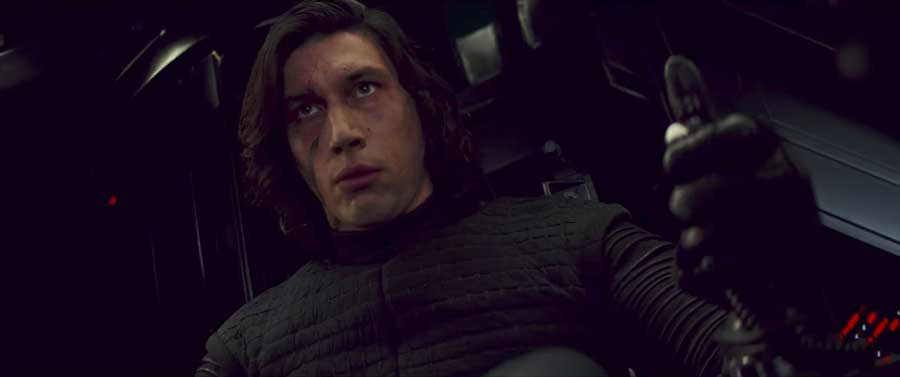
I’m curious, however, if Kylo assumes Luke is still alive in the next film (“See you around, kid!”) and how much impact that might have on the story. It’s possible that part of Luke’s plan was to humiliate Kylo and then disappear so that Kylo would spend months (years?) hunting him down, while the rebels (knowing he’s dead) go rebuild. Remember, although Snoke ripped the location of the island from Rey’s mind, I’m pretty sure Kylo still has no idea where Luke was hiding. So by taunting Kylo that way, Luke isn’t just a distraction for that one battle, he’s a CONTINUING distraction long after he’s faded away. On the other hand, I would easily buy that Kylo can sense that Luke is gone and doesn’t bother looking for him. Depends how JJ Abrams wants to play it (ug, that sentence makes me a little nervous).
Stokes: I thought it was obvious that the kids at the end were telling the tale of Luke’s last stand! Was that just me?
I mean if you want to ask how the story got out, Leia saw him go out to face the bad guys, and a few minutes later she sensed his death. She knows as much about him as we know about the Spartans at Thermopylae.
Peter Fenzel: The kids at the end are totally telling the story of Luke Skywalker facing down the First Order. A couple of ways they could have found out about it:
- The Resistance spreads the word, even though they can only really guess what happened.
- The kids see it because they are force sensitive. Luke might have broadcast his encounter to all force sensitive people nearby.
- Luke has visited one of them personally as a Force Ghost to tell them the story and tell them to spread it.
- They overheard one of the arms dealers tell a story about refusing to honor a warranty claim filed by General Hux on a hundred blaster cannons.
“HE WAS RIGHT THERE, AND NOTHING EVEN TOUCHED HIM!”
“Look Pippi Ragestocking, the warranty says right here it’s void in the case of Jedis.”
“BUT THERE AREN’T ANY JEDIS! WHY WOULD THAT EVEN BE IN A WARRANTY??!!”
“What can I say? I have an old lawyer.”
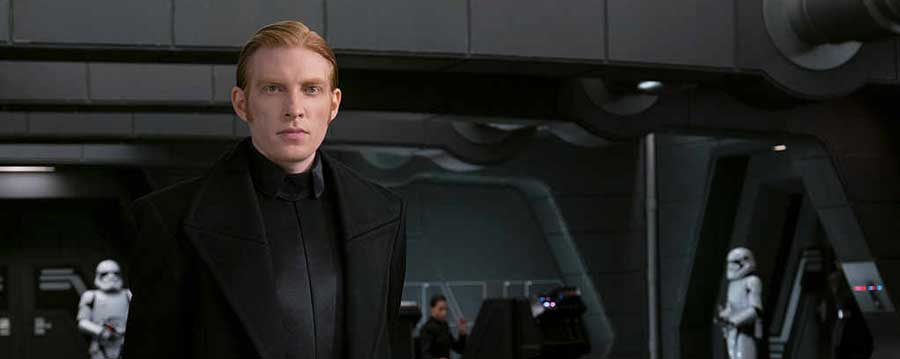
If the spread of the story is Force-assisted, it would seem like Force Ghosting is changing from being a Mufasa phenomenon to being a Tom Joad phenomenon. Luke is everywhere, wherever a baby is crying, wherever a soul cries out for justice.
(By the way, I know the plural of Jedi is Jedi. But I am disregarding world building details that don’t serve the story. Like Rian Johnson did.)
Stokes: As to the moral line thing: I’m not saying that Kylo crossed a moral line! Nor do I think Vader crossed a moral line when he struck down Obi-Wan in Episode IV. What I’m saying is that vanishing into a pile of robes seems to be a specific kind of light-side force magic, which involves death, and self-sacrifice, and sometimes involves being violently killed. Beyond that, we don’t know anything about it. It’s always been kind of a mystery! Not all good Jedi do it: most of the people who got killed in Episode IV just sort of toppled over. So what does it mean that Luke vanished here? Well, my interpretation is the stuff I laid out above. And “see you around” is easily as compatible with “I’m gonna haunt you so good!” as it is with “Just FYI, I am plotting against you somewhere and Definitely Still Alive.”
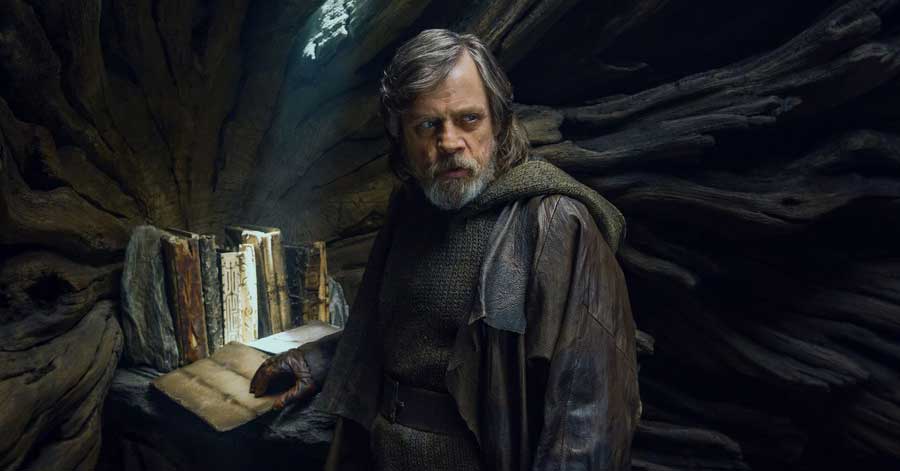
In my headcanon on this, it doesn’t matter that Kylo potentially had a good reason to kill Luke. It matters what his actual reason was. There’s a pleasing symmetry to the idea that it’s dangerous for the Sith to strike in anger.
Pete, the idea that Luke ought to be more Tom Joad than Mufasa is well in line with the rest of the movie. We’re explicitly told that the Force isn’t just for Jedi: it’s everywhere. We see at least one rando use the force (the stableboy, and I have my suspicions about Rose’s sister). The idea that Luke is now floating around telling everyone he meets how awesome his death was is not super appealing, but it’s at least thematically coherent.
This more democratic distribution of the Force is also, oddly enough, very much in line with the way that the Force worked in Rogue One. And for a really deep cut, the way that the Force works in the old Star Wars pen-and-paper RPG, in which everyone has Force points but for the most part non-Jedi just use them for massive bonuses on their regular dice rolls.
Belinkie: Stokes, still not convinced that the confrontation with Luke does anything to Kylo except pisses him off (which may count for something!) but you’ve convinced me of the Luke as war propagandist angle. What clinches it is the fact that he appears notably younger as the projection than he does in real life. He’s putting on a show, although I still wish they’d make it clear how the story gets out – your supposition about him going door to door as a Force ghost is a HUGE guess.
So Luke has a few reasons to do what he does: to help out the rebels, to impact Kylo, to give people a story of Jedi badassery. Add to that list a very real and deeply felt debt to Leia, who did beg him for help after all. Don’t forget R2D2’s one scene in the movie, where he heartbreakingly shows Luke the ancient “Help me Obi-Wan Kenobi” hologram.
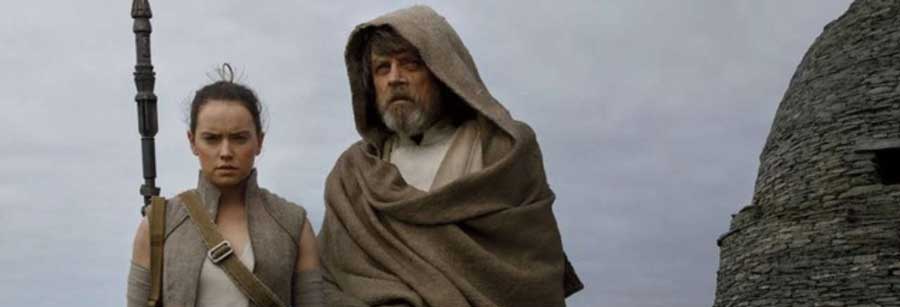
That’s a good transition to a key question: WHY does Luke decide to do what he does? At the beginning of the movie he’s adamant the Jedi have to end, but eventually he’s the one who confidently tells Kylo he won’t be the last one. What changes his mind? Rey, Leia, Yoda, or something else?
Stokes: Isn’t it kind of a cascade? R2 starts it off, by showing the picture of Leia. Luke then reactivates his Forcebook account so that he can check in on her. Meanwhile, he feels compelled to train Rey just enough so that she won’t end up destroying the world — but this goes poorly, and Rey storms off (just like Luke did in Empire). Enraged, Luke goes to burn the temple, and then Yoda visits (because he can now: remember, Luke had blocked his connection to the Force) and tells him what he needed to hear. So ultimately Yoda convinces him with that speech about teaching and failure — but without Leia and Rey, Luke wouldn’t have been in the right emotional state for Yoda’s speech to land, and without R2, Yoda couldn’t have gotten to him in the first place.
Belinkie: I’m a little fuzzy on Yoda’s speech because I was melting into a puddle of fanboy gratitude at seeing that old puppet one more time. The main point was that Luke needs to learn from failure? In this context, does that mean giving Rey the chance to be a better Jedi than Kylo was, instead of writing off the whole religion because he screwed up?

Stokes: I can’t recall it word for word either, but wasn’t there something in there where Luke’s like “She wouldn’t listen to me, I failed her,” and Yoda answers “And did I fail you, when you left?” Ahem. “And you, did I fail? When left you did?” Or something along those lines.
I could be totally wrong about the dialogue. What I am sure is that Yoda says that we pass our failures on to our students, and that this too is a form of teaching. It logically follows that Luke’s failures as a teacher are in some sense the result of Obi-Wan and Yoda’s failures.
Belinkie: This is really interesting, because I can’t help but think that neither Luke or Yoda actually is beating themselves up over THOSE failures. Luke can’t get past Ben/Kylo… and Yoda trained Anakin, who also killed the other students and destroyed everything. Now sure, Luke is more culpable than Yoda since he was DIRECTLY in charge whereas Yoda wasn’t actually Anakin’s master, and (more importantly) Luke really did draw a lightsaber while the kid was sleeping. But Yoda should and does feel bad about presiding over the absolute train wreck of Palpatine’s accession.
Luke’s position is, “We are bad teachers and we should give up.” Yoda counters with, “Bad teachers we are, but perhaps good teachers, bad teachers are?”
Which I think is a good point, but I’m not sure there’s a direct line to the action Luke takes. As we’ve discussed, Luke’s final sacrifice isn’t about teaching Rey, but perpetuating a popular myth of the Jedi. Is mythmaking a part of teaching, broadly defined?
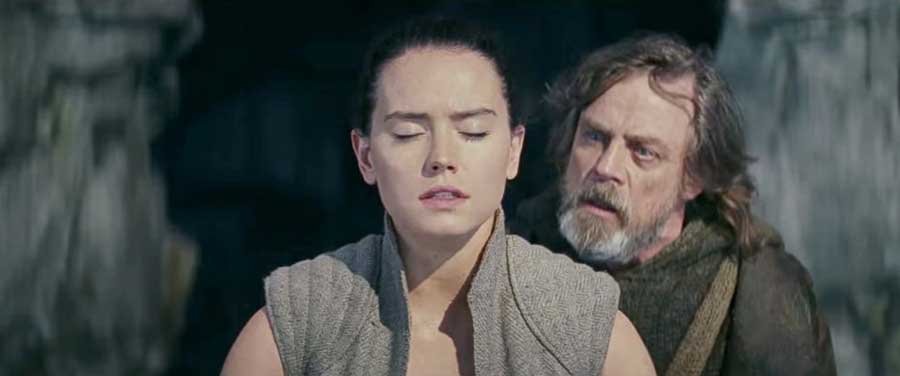
Stokes: Well, I think it is also about teaching Rey. Luke says he’s going to give her three lessons. She leaves after lesson number two. So you’ve got to be wondering what the third lesson is, right? Of course, it was originally probably going to to be something different, because when he wrote his syllabus he was trying to get her to abandon the cause. The first lesson was “The force doesn’t belong to the Jedi.” The second lesson was “Actually, the Jedi are kind of trash.” If I had to lay odds, I would have said that the third lesson was going to be “And furthermore, I, Luke Skywalker, am personally trash.”
But the third lesson actually turns out to be the inverse of this: “Despite the failings of the Jedi order, despite my own failings, I am still worthwhile. It is ok to believe in me, and to believe in heroism, and to try to be heroic, etc. etc.”
So he’s giving the orphaned outcasts of the world something to believe in — well Rey’s an orphaned outcast too.
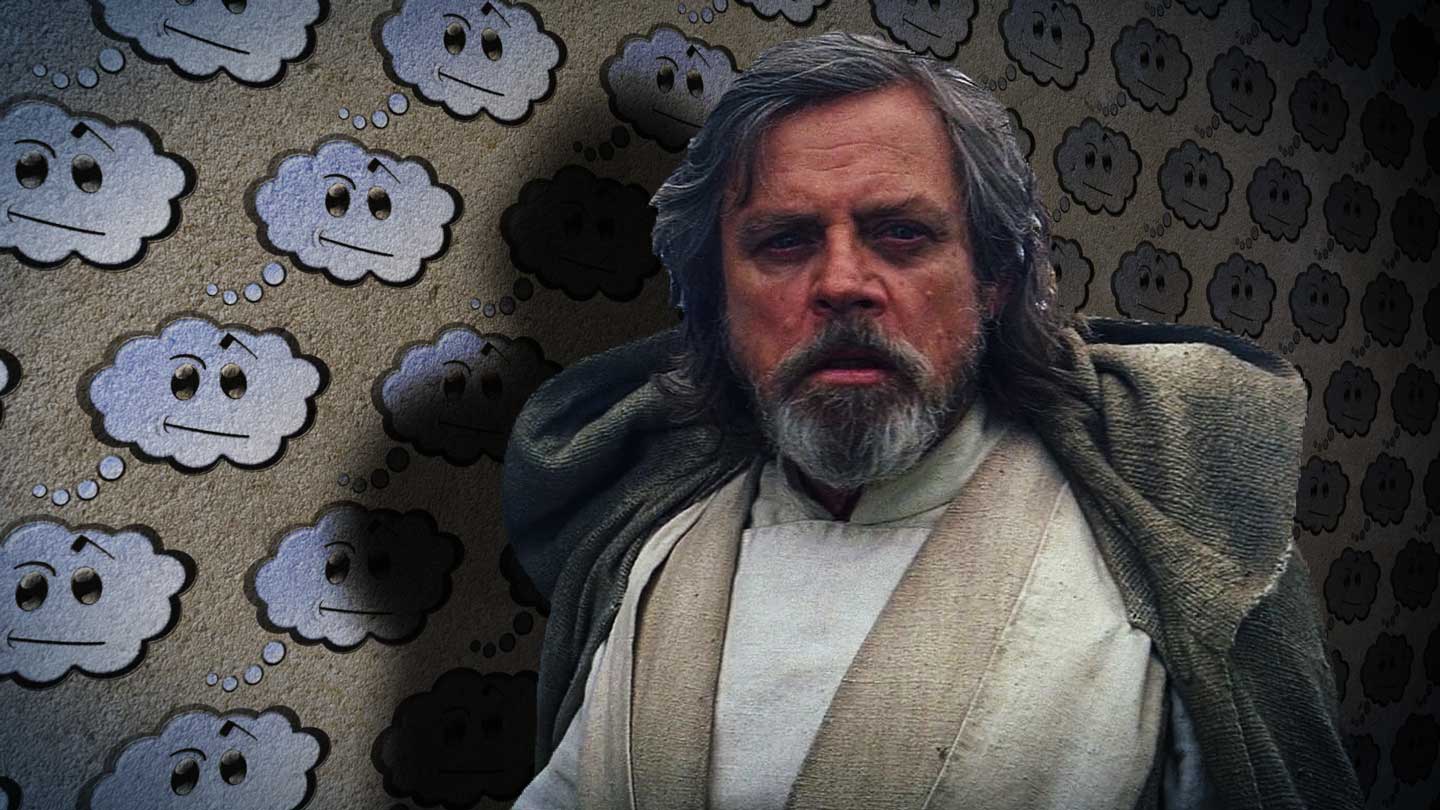
“Luke’s final sacrifice isn’t about teaching Rey, but perpetuating a popular myth of the Jedi. Is mythmaking a part of teaching, broadly defined?”
This point brings together a few threads in the film that I couldn’t quite figure out how to connect until now.
1) the ‘smash 4 olds’ ethos of the whole movie (which seemed like an extended expression of frustration w/ Abrams’ approach in ep. VII) culminating in Poe’s foot sticking out the bottom of the rusty speeder
2) Rei’s mise en abyme (literal abyss plus literal infinite mirror reflections)
3) the burning bush image that results when lightning strikes the tree
We don’t generally think of the Jedi religion as doctrinal, as having any interest in truth. The burning bush image basically makes Luke Moses (they are calling on him, after all, to get his people out of the desert). But Moses isn’t Moses without laws/commandments, and Luke’s last heroic deed is to create an illusion, not to reveal a truth. I don’t think the Jedi books fill the role of commandments. The law/commandments here is hope (or myth, or storytelling–same thing). What Rian has done is made myth part of the Force. That’s the significance of Rei’s mise en abyme moment (which… why didn’t her descent represent any kind of moral fall–to the dark side?)–the Force holds everything together = myth holds everything together. When I saw Episode VII I thought that visually, it was taking us back to the roots of Star Wars in Orientalist painting (visually, the wrecked star destroyer on Jakoo is basically a pyramid…). This one is taking us back to the 1001 Nights or the Neverending Story.
Hang on, can you explain in more detail how the mise-en-abyme thing relates to this? It’s a dark side manifestation: presumably whatever’s going on there would not be the same as whatever is going on with Luke. So if Luke’s new message is something about storytelling/hope (and I like the idea that those are sort of the same thing!), then the cave of mirrors should be… something other than that, right? Maybe the opposite, somehow?
So, I may have forgotten something from that mise en abyme scene, I remember the reflections, and other than that, nothing *we* saw there was particularly evil. We could take that absence simply as ‘we don’t know what she saw’, but that’s lame (again, assuming I’m not forgetting something?) So the multiple Reys should be important. I took them to signify the creative and deceptive power of myth (and notice how the reflections are just like Luke’s big trick at the end–he fashions an image of himself). What’s dark-sidey about it in the abyss is we only see her, over and over, in a void–basically, it’s her moment of self-realization, but also of narcissism. The Force is (and always has been) the coincidentia oppositorum (that which contains its own opposite). So is myth–both hope and deception are myth, and myth is always both of those things.
An entire army sees Kylo get bamboozled by Luke. Maybe the storm troopers don’t get shore leave, but somewhere up the chain of command you have to run into people who interact with the rest of the galaxy. All it takes is a couple of the senior officers who were willing to follow Snoke, but don’t feel the same loyalty towards Kyo, especially after his recent string of spectacular failures (guy just lost the First Order a PLANET sized weapon one move back).
That’s an interesting point but I’m not sure that it looks like Kylo got bamboozled to all the guys in the AT-ATs. Kylo fights Luke, charges him, Luke disappears 10 seconds later. Neither of them even touched each other for the whole fight. Sure, it’s pretty clear Kylo is raging while Luke is cool as a cucumber, but it’s not like Kylo got smacked down and left in the dirt. I’d say the whole thing looks inconclusive if you don’t hear what they’re saying.
Bottom line is I think JJ Abrams has a lot of room for interpretation in what this encounter means to Kylo, to the First Order, and to everyone else who somehow heard this story (which I still wish was better explained).
If the Force is *equated to* myth/hope as I think Johnson was trying to establish here, then the issue of communication is conveniently evaded. Everybody (at least the Force-sensitive) just kind of know that There Is Hope In The Galaxy.
Luke’s third lesson, in a deleted scene, was reportedly going to be that good/light comes from action, not doctrine. He tricks Rey into rushing off to defend the island’s caretakers from raiders (who turn out to be harmless).
I re-watched the movie today and paid close attention to the final scene with the kids. It’s 100% unambiguous that they are re-enacting Luke’s last stand against the First Order: we see objects that clearly stand in for First Order walkers and the Resistance blast door, with Luke in between.
What’s more interesting, however, is the fact that the kids are using a language that we as the audience aren’t privy to. No subtitles, just some excited gibberish mixed in with Luke’s name. We can only speculate what kind of story they’re telling. Maybe they’re getting it totally wrong and they say that Luke laser-sworded the entire First Order column, and THAT’s what inspires them to hold their broomsticks to the sky!
Ok, they probably haven’t misinterpreted it to that level, but maybe some details got warped along the way, and maybe that’s not so bad. The galaxy needs a new heroic myth, they got a new heroic myth.
One of the most disappointing moments in all of Star Wars canon to me is when Yoda draws a lightsabre in Episode 2. As the highest master of the Light Side I was hoping that his fighting would be less physical. “Luminous beings are we. Not this crude matter.” I don’t know what the ideal form of that conflict would be but I think Luke’s last stand is closer than anything else. So on top of saving the rebellion, inspiring future Jedi, and apologizing to his family (Leia and Ben) he also accomplishes showing a level of mastery of the force unseen before. Ben sees power beyond his own and Rey sees a way of fighting that encompasses the philosophical side of the Jedi order.
The Crate and Crowbar did an episode overthinking The Last Jedi and they saw a theme of students surpassing their masters which they say this scene reinforces. I recommend it highly. It also has the phrase “the democratization of revolutionary power in the Star Wars universe is not the thesis I thought I would be writing today” which made me laugh. It’s on youtube if anyone wants to check it out https://youtu.be/Z7rDENAvC_8